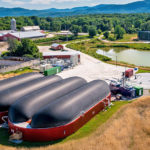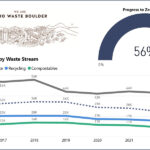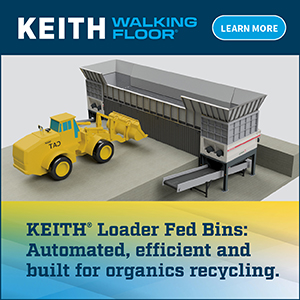Top: Graphic courtesy CoPIRG Foundation and Eco-Cycle
The 8th Annual State of Recycling And Composting in Colorado was released in November 2024 by EcoCycle and CoPIRG Foundation, two nonprofits in the state that support zero waste and circular economies. Since 2018, when Colorado updated its waste tracking process, the state slightly reduced the amount of total waste generated from 7,077,958 tons in 2018 (reported in 2019) to 6,870,398 tons in 2023 (reported in 2024), while the total state population increased. The per capita municipal solid waste (MSW) generation has also gone down from 6.8 lbs/person/day in 2018 to 6.4 lbs/person/day in 2023. At the same time, the landfill diversion rate in Colorado (commonly referred to as the recycling rate), decreased slightly — from 17.2% diverted to recycling and composting in 2018, to 15.5% in 2023. Part of the reason, notes the report, is that “many Colorado communities have not yet taken action to guarantee access to convenient recycling nor provided options for diverting organics.”
Five cities and their recycling and composting rates were highlighted as “Colorado’s Leaders for Best Recycling and Composting Programs in 2023”: Boulder, Loveland, Ft. Collins, Aspen, and Durango. Commonalities among these programs include:
- Universal curbside recycling programs in which every resident is provided with a recycling cart alongside their trash cart, often at no additional charge to residents.
- Volume-based pricing for trash that encourages recycling and composting by charging based on the amount of material landfilled and providing recycling and sometimes composting access for no additional cost.
- Convenient drop-off centers and access to curbside collections for food scraps and/or yard trimmings.
- Strong education programs that teach residents and businesses why recycling and composting are important and provide clear guidelines on what can and cannot be recycled, reused, and composted.
- Community interest, advocacy, volunteering, and engagement in waste reduction and diversion, as well as dedicated staff and funding for waste diversion infrastructure, services, and programs.
Conclude the authors, “As we build toward a circular economy, Colorado has made significant strides in passing policy and creating programs that address the ‘materials’ side of our economy, or the products and packaging. It is now time we do the same for the ‘organics’ side. Diverting organic matter such as food scraps and yard trimmings from landfills avoids methane emissions and creates valuable soil amendments for depleted Colorado soils, including compost, biochar, and mulch, which protect and build healthier soils. The SB23-191 Colorado Organics Diversion Study makes it clear that Colorado could increase organics diversion from around 10% of organic materials to 60% by 2036. This increase would require the addition of more collections and processing infrastructure as well as policies that require the diversion of organic material from landfills through donation of usable food and composting of nonedible organic material, similar to the policy the City of Aspen adopted in 2023. Of the reporting communities with diversion rates of 25% or more, all have access to organics diversion programs — either for food scraps, yard trimmings, or both.”














